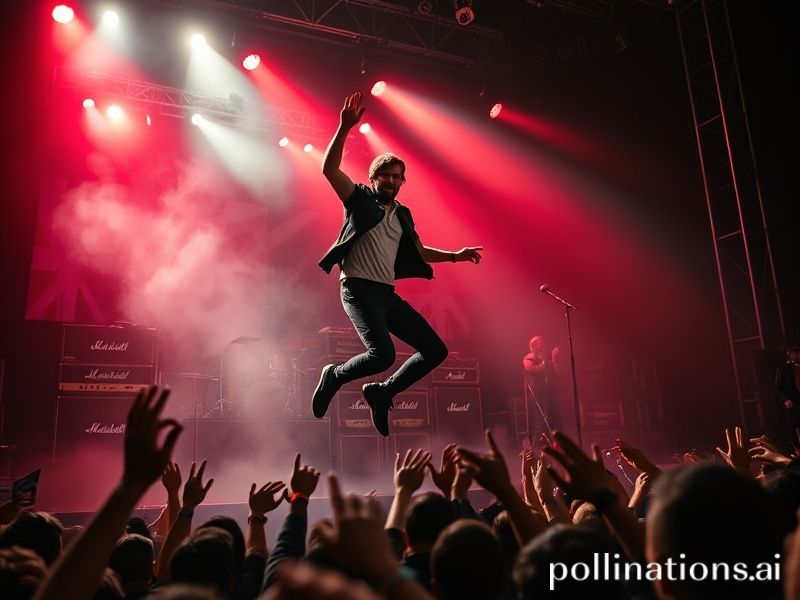Kasabian: The One Word Rocking Stadiums, Security Alerts, and Search Engines Worldwide
Kasabian: The Word That Refuses to Stay Buried
By Dave’s Foreign Desk
PARIS—Every so often a single syllable ricochets across continents like a drunken tourist who’s lost his passport. “Kasabian” is that syllable—pronounced kuh-SAH-bee-un to the Brits, ka-SAH-bian to the Americans, and “turn that racket down” to anyone over 55. Internationally, the word now carries three passports: one stamped by a rock band from Leicester, one signed in blood by a Mumbai terrorist, and a freshly issued visa courtesy of several global streaming algorithms that think you might also like anxiety.
Let’s start with the band, because that’s the version most likely to blare from festival speakers in Bogotá or Bangkok this summer. Since 1999, Kasabian (the musicians) have exported a stadium-sized swagger best described as Oasis snorting pre-workout powder. Their anthems—equal parts football-terrace chant and Bond-villain crescendo—have become the sonic wallpaper for everything from Champions League highlight reels to Russian car-crash dash-cam compilations. When Serge Pizzorno yells “You’re in the firing line!” on a Prague stage, it’s unclear whether he’s addressing the crowd or simply the geopolitical temperature of 2024; both interpretations feel accurate, which is why the band still sells out in places that can’t locate Leicester on a map but know exactly what it feels like to be angry and broke.
Meanwhile, the name’s darker doppelgänger—Mohammed Ajmal Amir Kasab—has been haunting Wikipedia footnotes since 2008, when he helped turn Mumbai’s Taj Hotel into a live-streamed war zone. Linguistic coincidence? Possibly, but try telling that to an Indian security algorithm that still flags the word on airline manifests. In New Delhi, “Kasabian” triggers the same sort of nervous bureaucratic cough that “Binladen” once did in U.S. customs. The lesson: global language is now a minefield where syllables wear suicide vests.
Then there’s the third meaning, the one Silicon Valley just minted. Type “Kasabian” into any search engine and you’ll be offered an AI-generated playlist titled “Post-Brexit Rage Pop.” The algorithmic assumption is that if you like a band named after a terrorist, you must also enjoy apocalyptic kettledrums and the faint whiff of cordite. This is how soft power works in 2024: a word mutates, metastasizes, and ends up soundtracking a TikTok of Ukrainian drone footage set to an indie-rock chorus. Somewhere in a Menlo Park server farm, a microchip is shrugging.
The broader significance? We live in an era where a single phonetic accident can carry the emotional load of three separate nightmares. That’s not postmodern whimsy; it’s supply-chain globalization applied to meaning itself. The same container ships that carry avocados and antidepressants now haul signifiers, too—unmarked crates labeled “Kasabian” that might contain vinyl, virality, or historical trauma. Customs agents of the psyche inspect them at their peril.
And the band, bless their leather-jacketed hearts, keeps touring as if none of this lexical turbulence exists. Last month they played Istanbul under a blood-red moon while riot police rehearsed crowd-control choreography outside. Inside the arena, 12,000 people chanted “Fire” with the fervor of citizens who’ve seen the real thing. The irony was thicker than kebab smoke: a British group named by accident after a Pakistani gunman sound-tracking Turkish discontent under a NATO sky. If you listened very closely, you could hear the planet trying to file a trademark claim.
Conclusion: The next time someone says “Kasabian,” ask them which one they mean—the lads from Leicester, the ghost of Mumbai, or the algorithm that thinks you’re in the mood for existential dread with a backbeat. The answer will tell you everything about where they stand on the atlas of modern anxiety. And if they just stare blankly, congratulations: you’ve found the last human on Earth whose search history isn’t a crime scene. Cherish them. They won’t last long.







